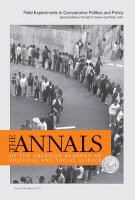Read more
Klappentext Standing on the methodological frontier of field experimentation! researchers studying politics face a unique set of challenges. How do field researchers interact with policymakers! public officials! and funding agencies? How do they ensure high standards in the generation and reporting of empirical results? How can they redefine the role that experimental methodology plays in the study of politics today? This volume of The ANNALS addresses these questions! examining the use and application of the field experiment method in political science and presenting the state of the art in this important field.By the 1980s! students of political behavior had abandoned field experiments for analysis of large-scale surveys. Then with the first voting experiments conducted in 1998 û examining the impact of mail! telephoning! and canvassing strategies on turnout û a resurgence of field experiments in politics was set in motion. This new wave of methodology led to important changes in the discipline: a growing significance on research design and the acquisition of new research methods and skills. Since the 1998 voter experiments! the domain of research and experimental settings topics has expanded notably! with a vigorous field experiment agenda in a variety of social! economic! and cultural contexts. There has been a profusion of experiments in real-world settings with a diversity of interventions and experimental contexts that have come to characterize field experimental political science. These compelling essays! derived from the 2008 Conference of Field Experiments in Comparative Politics and Policy! held at the University of Manchester in the United Kingdom! represent new developments in the field! recent trends in statistical analysis and in dealing with problems of measurement and validity. These creative scholars offer valuable insight into this developing style of research and the role that experimental methodology can play in the study of politics. This important volume of The ANNALS features provocative and insightful contributions that reflect the ways that field researchers! in an international context! use the method in novel ways and tackle more subtle challenges of design and analysis. This volume is a must-read for researchers of politics and policy û especially those ready to expand the substantive and methodological frontiers of field experimentation. It is also a valuable resource for political scholars and policymakers. Inhaltsverzeichnis Introduction - Donald P. Green and Peter JohnParable of two agencies! one of which randomises - Dominic Pearson! David J. Torgerson! Cynthia McDougall and Roger BowlesDemocracy! Governance! and Randomized Development Assistance - Devra C. MoehlerTranslating experiments into Policy - Gerry StokerThe Promising Integration of Qualitative Methods and Field Experiments - Elizabeth Levy PaluckThe Future of Field Experiments in International Relations - Susan HydeWhy can't a Student be more like an Average Person? Sampling and Attrition Effects in Social Science Field and Laboratory Experiments - Marc Hooghe! Dietlind Stolle! Marc Hooghe! Valérie-Anne Mahéo and Sara VissersPoints of intersection between randomized experiments and quasi-experiments - Jane GreenReporting methodological items in randomised experiments in political science - Isabelle Boutron! Peter John and David J. TorgersonTheory! external validity and experimental inference: Some conjectures - Fernando Martel Garcia and Leonard WantchekonExpanding the use of experiments on civic behavior: experiments with local government as research partners - Sarah Cotterill and Liz RichardonHelp Me Help You: Conducting Field Experiments With Political Elites - Peter Loewen! Daniel Rubenson! Leonard WantchekonConceptual! design! and statistical complications associated with participant preference - Hannah Ainsworth! David J. Torgeson and Arthur Kang'ombeStr...

